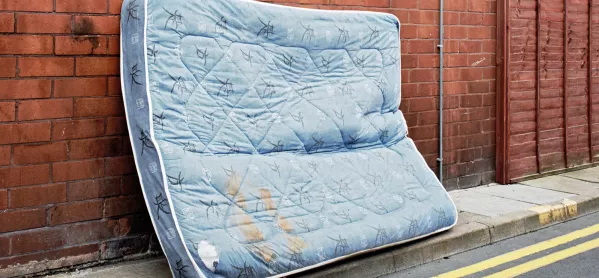Goodnight, sleep tight - we spend a third of our lives in bed, not because we’re lazy but because it’s what the brain needs.
For children, sleep is even more important, with the NHS recommending 11 hours for a five-year-old and nine hours for a 16-year-old.
Healthwise, in the young, a shortage of sleep has been linked to a greater risk of obesity and lower immunity, as well as a lack of emotional control, poor school performance and mental health issues.
A joint report this week by the health and education select committees, Children and Young People’s Mental Health - The Role of Education, draws attention to links between excessive social media use, sleep deprivation and depression in children and young people (see “School funding cuts harming pupils’ mental health, MPs warn”).
If a child is tired when they come to school in the morning, the obvious conclusion to draw is that they stayed up late into the night using social media or playing video games. But there are children who do not have computers or any device to keep them awake yet still fall asleep at their desks.
These are the children without beds.
A bed of one’s own is something that the vast majority of us take for granted. Like food, it is a basic need. But for an increasing number of youngsters in this country it is a luxury - with huge implications for other areas of their lives.
Buttle UK, a charity that works with disadvantaged children and teenagers, says that the number of beds it has had to provide has more than trebled in the past 10 years. It estimates that there are some 400,000 children in the UK who do not have a bed of their own. They have to sleep on the floor, on the sofa or with others, who are sometimes not even related to them.
Dan Morrow, a headteacher of a primary school in Kent serving a large number of disadvantaged families, agrees that it is a problem that is getting worse.
“Lack of beds has become a huge issue in the last two years, in a way it definitely wasn’t before,” he says.
The effect on pupils means that they come to school “shattered”, he says. “And I do mean shattered.” Because of this, he has had to restructure the school day.
The effect of a bad night’s sleep
But a lack of sleep does not always manifest itself in sluggishness and tiredness during the waking hours. For some children, it has the opposite effect.
A head of a secondary school in the south of England once recounted the problem of a Year 7 pupil who was being disruptive and difficult. To encourage good behaviour, rewards were discussed with the child’s mother. The incentive the mother suggested was a mattress for the child’s bed. He’d behave a whole half-term for that, she said. The boy was sleeping on the wooden slats.
These are the hard facts of life for some children in 2017, in a country where food banks are an accepted way of life. Somehow, it seems, we have become inured to poverty.
For many heads and teachers, school is now about so much more than education. Society constantly calls on them to cure its ills and government constantly holds them to account in an environment that they have no hope of controlling.
It’s hard to teach a hungry child. It is for this reason that many schools already provide breakfast.
It’s hard to teach a tired child. So will we soon be expecting schools to provide a bed, too?
Sometimes it’s hard to sleep easy at night.
@AnnMroz




